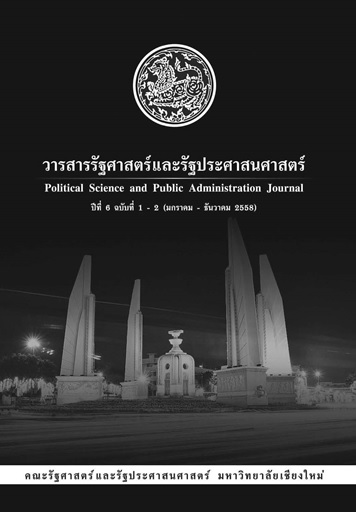The Nonviolent political movements; Case study of People Alliance for Democracy and People Power Revolution
Main Article Content
Abstract
People Alliance for Democracy occurred during 2005 to 2006 and 2008 to against with Thaksin government, anti-Thaksin Regime, and call for the political reform in Thailand. And the People Power Revolution in the Philippines was a gathering of many political movements moved against with Marcos dictatorship which occurred since the late-1960-1986. In this study using concept of political opportunity structure to compare both of political movements in Thailand and the Philippines in order to explain the contexts of formation, mobilization and choosing nonviolent action as a strategy for their movements. The result of study found that the changing in political, social and economic environment results in framing of collective action and mobilizes of people in political movement. Political situations and trigger factors could encourage in the mobility of people and justify their legitimacy in political movements. So, the main reason of committing the nonviolent action would come from the justification in meaning of their political movement to against with the opponent including the position in their political sphere, the political opportunity structure and react of the alliances, counter movement and government.
พันธมิตรประชาชนเพื่อประชาธิปไตยเป็นกลุ่มการเคลื่อนไหวทางการเมืองในประเทศไทย ในช่วงระหว่าง ปี 2548-2549 และ ปี 2551 เพื่อต่อต้านรัฐบาลของ พ.ต.ท.ดร.ทักษิณ ต่อต้านระบอบทักษิณและเรียกร้องการปฎิรูปทางการเมือง ส่วน People Power Revolution เป็นการรวมกันของกลุ่มเคลื่อนไหวทางการเมืองและสังคมต่างๆ เพื่อต่อต้านระบบเผด็จการของประธานาธิบดีมาร์กอสในประเทศฟิลิปปินส์ ในช่วงปลายปี 1960-1986 การศึกษาครั้งนี้ใช้แนวคิดโครงสร้างโอกาสทางการเมืองในการเปรียบเทียบกลุ่มเคลื่อนไหวทางการเมืองทั้งสองกลุ่ม เพื่ออธิบายบริบทการก่อตัวของการเคลื่อนไหวและการไม่ใช้ความรุนแรงในฐานะยุทธศาสตร์ของการเคลื่อนไหว ผลจากการศึกษาพบว่าการเปลี่ยนแปลงของสภาพแวดล้อมทางการเมือง สังคมและเศรษฐกิจมีผลต่อการเกิดการรวมกลุ่มและระดมมวลชนในการเคลื่อนไหวทางการเมือง สถานการณ์ทางการเมืองและปัจจัยกระตุ้นส่งเสริมให้เกิดการเคลื่อนไหวและเป็นเหตุผลรองรับความชอบธรรมในการเคลื่อนไหวทางการเมือง ดังนั้น เหตุผลหลักในการเลือกการไม่ใช้ความรุนแรงจึงมาจากการสร้างเหตุผลรองรับในการเคลื่อนไหวทางการเมืองเพื่อต่อสู้กับฝ่ายตรงข้าม รวมทั้งสถานะในพื้นที่ทางการเมือง โครงสร้างโอกาสทางการเมืองและปฏิกิริยาจากฝ่ายสนับสนุน ฝ่ายต่อต้านและรัฐบาล
Downloads
Article Details
- เนื้อหาและข้อมูลที่ลงตีพิมพ์ในวารสารรัฐศาสตร์และรัฐประศาสนศาสตร์ถือเป็นข้อคิดเห็นและความรับผิดชอบของผู้เขียนบทความโดยตรง ซึ่งกองบรรณาธิการวารสารรัฐศาสตร์และรัฐประศาสนศาสตร์ ไม่จำเป็นต้องเห็นด้วย หรือร่วมรับผิดชอบใดๆ
- บทความและข้อมูล ที่ได้รับการตีพิมพ์ในวารสารรัฐศาสตร์และรัฐประศาสนศาสตร์ ถือเป็นลิขสิทธิ์ของวารสาร หากบุคคลหรือหน่วยงานใดต้องการนำข้อมูลไปใช้ประโยชน์ในทางวิชาการ ขอให้อ้างอิงแหล่งที่มาด้วย
References
Brenda Tuazon and Rod Villa. 1986. “People get treat of many surprises”. Bulletin Today, 25 February, 2.
Constitution Drafting Commission, Constituent Assembly. 2007. Constitution of the Kingdom of Thailand, B.E. 2550 (2007). Bangkok: Bureau of Printing Services, The Secretariat of the House of Representatives.
Crisostomo, Isabelo T. 1987. Cory, Profile of a President: The Historic Rise to Power of Corazon. Selangor, Malaysia: Pendaluk.
Guerrero, Salvador. 1988. The Reform the Armed Forces Movement (RAM): A Creation of Historical Experience. KASARINLAN Philippines Quarterly of Third World Studies, 3 (3), 51-58.
Hung, Samuel Shengfei. 2012. “The EDSA Revolution in the Philippines and the Prologue to the Peaceful Revolution in Taiwan”. The Fifth Taiwan-Philippines Academic Conference:Digital Humanities and Cultural Studies. Available from ddh.epage.au.edu.tw/.../pta_41082_3929074_77896.doc (accessed January 20, 2014).
Hornedo, Florentino. 1987. People power as the Traditional Filipino Go – Between. Pantas: A journal for Higher Education, 1(1), 23-26.
JP Fenix. 1986. “Marcos: last 80 hours in RP”. Philippine Daily Inquirer, 28 Febuary, 2. Kengkit Kitilianglab and Hewison, Kevin. (April – June, 2009). “Bod Wipak “Kan Muang Phak Prachachon” Nai Pra Thed Thai: Kor Jamkad Kong Naw Vikrol Lae Yutasart Kan Muang Bab “Kabuan Kan Krean Wai Tang Sangkom Rub Bab Mai” [Critical Article “Politics of People Sector” in Thailand (Kan Muang Phak
Prachachon): the limited of analysis and strategy in “New Social Movement”]. Fah Diew Kan, 7 (2), 120 – 155.
Korakit Tosawasd. 2010. The Paradigm Shift of Political in Democratic Regime:Political Conflict in Thailand between 1992-2010. Master Degree Independent Study, Faculty of Political Sciences, Thammasart University.
172
Lagmay A.1986. “Cultural and philosophical dimensions of the February Revolution”. Psychological Association of the Philippines, the Philippines Scenario after the February Revolution: A Psychological View, Manila: Psychological Association of the Philippines.
Macaraya, Bach M. 1988. Workers’ participation in the Philippine people power revolution – An examination of the roles played by Trade unions in the Philippine “People power” revolution. Manila: Friedrich Ebert Stiftung.
Magno, Francisco. 1986. The political dynamics of people power. KASARINLAN: Philippine Quarterly of Third World Studies, 1 (4), 13-18.
Manager Newspaper. (Ed.). 2008. Songkram Krang Sud Tai Auo Prathet Thai Kong Rao Keen Ma [The last war: Bring Thailand our country back]. Bangkok: Ban Phar Arthit publishing.
Matichon. 2008. ‘Jakapob’ Eang Ti Kao Tam Chart Pung Yub 5 Khren Vittayu [“Jakapob” claimed put a spin on news destory the nation; seized 5 radio stations] Mathichon. 25 March, 15.
Mathichon. 2008. ‘Jakapob’ Tob Kratu ‘Prachatipat’, ‘MCOT’ – ‘Yud Khren Krom Pracha Sampun’ [‘Jakapob responded Democrat in case of seized MCOT and Public Relation Department]. Mathichon. 28 March, 2.
Mayer, David S. and Minkoff, Debra C. 2004. Conceptualizing Political Opportunity. Social Forces, 82(4), 1457 -1492.
Montiel, Cristina Jayme and Chiongbian, Victoria Marie. 1991. Political Psychology in the Philippines. Political Psychology, 12 (4), 759 - 777.
Nelson, Michael H. 2006. “Political Turmoil in Thailand:Thaksin, Protests, Elections, and the King”. Eastasia. 5 (1), 1-22.
People Alliance for Democracy. 2008. The Public Statement issued 1/ 26 February, 2008 in “Kam Tien Kon Ked Kree Yuk [Warning before Disorder period happen]. Manager Online. Available from: http://www.manager.co.th/Politics/ViewNews.aspx?NewsID=9510000088721. (accessed 30 January, 2014).
People Alliance for Democracy. 2008. The Public Statement issued 9/ 22 May, 2008 in “Chum Num Yai Tor Tan Kan Lom Lang Ratthathmmanoon [Mass demonstration against overthrow the Constitution]. Manager Online. Available from: http://www.manager.co.th/Politics/ViewNews.aspx?NewsID=9510000059495. (accessed 30 January, 2014).
173
Pimentel, Jr., Benjamin. 1989. Edjop the unusual journey of EDGAR JOPSON. Quezon city, Philippines: KEN.
Sharp, Gene. 1973. The Politics of Nonviolent Action, Part One: Power and Struggle. Massachusetts: Extending Horizons Books.
Sharp, Gene. 1973. The Politics of Nonviolence action: Part two of: The Methods of Nonviolence Action. Boston: Porter Sargent Publishers.
Tarrow, Sidney. 1994. Power in Movement. USA: Cambridge university press.
Thompson, Mark R. 1995. The Anti – Marcos Struggle. New Haven: Yale University Press.
Tolosa, Benjamin T., Jr. (Ed.). 2011. Socdem; Filipino Social Democracy in a Time of Turmoil and Transition, 1965 – 1995. Manila: Friedrich-Ebert-Stifitung. Torres, William. 2006. “The Electoral System must be changed”. Special EDSA 20th Anniversary Issue. Available from: http://pcij.org/i-report/edsa20/williamtorres.html. (accessed October 11, 2013).
Uchane Chaingsang. (n.d). “Pantamit Prachachon Pea Pracha Tippatai [People Alliance for Democracy]”. Thai politics and government database of King Prajadhipok’s Institution. Available from: http://www.kpi.ac.th/wiki/index.php/. (accessed January 15, 2014).
Uchane Chaingsang. 2013. A History of Kanmuang Phak Prachachon (People’s Politics): The Ideas and Practices of “Political Activists” in the Present”, Master Degree Thesis, Faculty of Political Sciences, Thammasart University.


